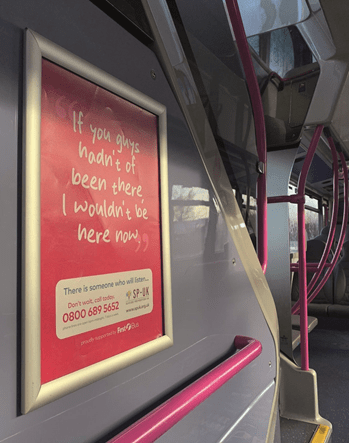
First West of England has joined forces with Bristol-based Suicide Prevention UK in what it believes is the first partnership of its kind and at such scale in the UK.
The partners point to new research which shows that people at risk of suicide are increasingly using buses to travel to the place they plan to take their lives to avoid being detected by emergency services, and have launched a ‘There is someone…’ campaign which aims to help those thinking about taking their life by offering support and guidance by highlighting that there is someone who can listen, talk and help. It will also focus on educating bus drivers about the signs to look out for among distressed passengers, and to be aware of suicide risk areas on bus routes.
First West of England’s Managing Director Doug Claringbold said: “The research we’re hearing from Suicide Prevention UK is so compelling, and highlights the really important role our drivers have in helping to save lives. Anyone contemplating suicide must be in the most desperate state imaginable and we must do all we can to help them recognise that there is help, and there are people to talk to.
“Some take the bus industry for granted and think it’s just about getting people from A to B, but it is far more than that; it’s about our place in wider society, and I’m so pleased that through this partnership we can play our role in providing help by supporting this hugely worthwhile charity.”
Suicide Prevention UK was launched five years ago, and provides a team of volunteers who patrol suicide risk areas in the west of England, offering help to those who may be considering taking their own lives. In the past three years, the charity says it has responded to more than 43,000 calls from people across the UK who are struggling with their mental health or considering suicide.
Data from its volunteer patrols found that at least three in 50 (about 6%), of those asked said they had taken public transport to the location where they planned to take their life, but the charity believes that the number could be much higher.
As part of the campaign, training given to drivers around suicide and mental health will be improved to now include how to spot the physical and visual signs among customers as well as spotting any actions which may indicate they need help. As part of that training, drivers will also be advised of potential high-risk areas on bus routes, and will also be given advice on how to get help quickly if they think someone is considering or about to take their own life.
An associated on-board marketing campaign will start in the coming weeks, with up to 1.5million passengers each week on more than 500 buses in the West of England having access to information about where to get help, and First is also offering the charity free bus travel for its volunteers while on duty.
Among those supporting the partnership is Bath-based Inspector Colin Partridge, who last summer, while working at Bath bus station, saved a teenage girl from taking her own life on a nearby bridge. He said: “This partnership is really important as that bus trip could be that person’s final journey, and if there was information on the vehicles it may get someone to think twice and maybe encourage them to call the helpline and just talk to someone. As a bus company we do lots of miles across lots of different built-up and rural areas so knowing how to spot some signs and recognising people’s body language when they get on the vehicle could be really helpful, even if it’s just so we can keep an eye on them or alert others to something not quite right.
“We have quite a few drivers who ring us to say ‘there’s a person on the bus I’m not too sure about, can you come and speak to them’. But for drivers it can be hard; we see lots of people everyday and although our days can be really busy, and it’s usually just a hello or goodbye to passengers, sometimes you have to make the effort to have a conversation with those who you think might need help and support.”

